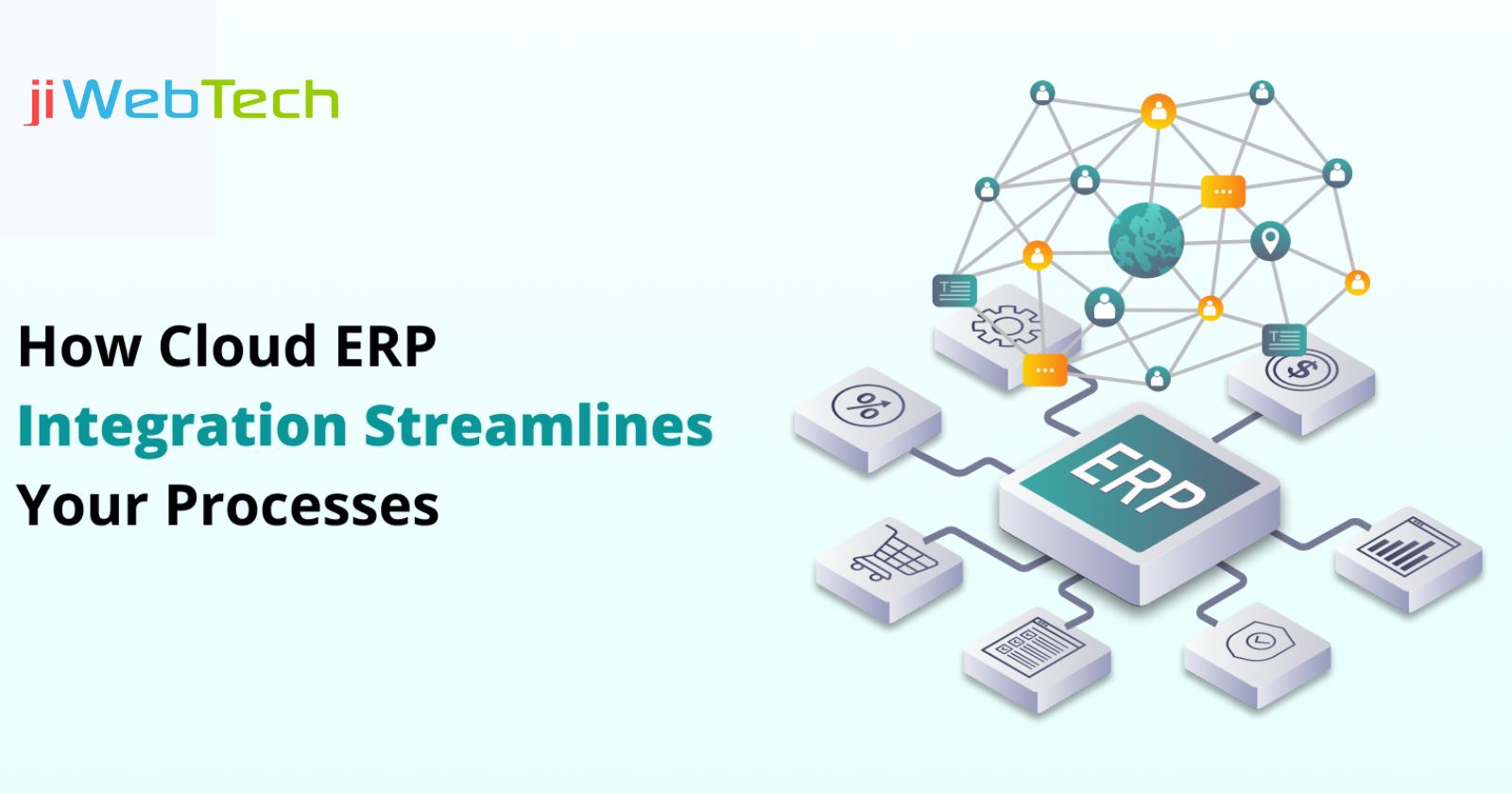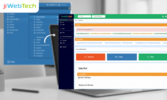- Dec 17, 2024
- Enterprise
- 2740
Share this post on:

In today's fast-paced business environment, organizations are increasingly turning to Cloud Enterprise Resource Planning (ERP) systems to streamline their processes and enhance operational efficiency. Cloud ERP integration refers to the process of connecting various cloud-based applications with an ERP system, creating a unified platform that enhances data flow and communication across different departments. This blog delves into how Cloud ERP integration can revolutionize business processes, improve productivity, and drive growth.
Understanding Cloud ERP Integration
Cloud ERP integration involves linking cloud-based applications—such as Customer Relationship Management (CRM), Human Resources Management (HRM), and Supply Chain Management (SCM)—with a central ERP system. This integration eliminates the need for manual data entry, reduces errors, and provides real-time visibility into business operations. By creating a cohesive ecosystem of applications, organizations can optimize workflows and enhance collaboration among teams.
Key Features of Cloud ERP Integration
1. Real-Time Data Access: Integrated systems allow employees to access up-to-date information from various departments, facilitating informed decision-making.
2. Automation: Automation of repetitive tasks reduces manual intervention, minimizes errors, and improves operational efficiency.
3. Centralized Data Management: A unified platform ensures that all data is stored in one place, making it easier to manage and analyze.
4. Scalability: Cloud ERP systems can easily scale as a business grows, accommodating additional users or functionalities without significant investment in infrastructure.
5. Enhanced Security: Cloud providers often implement robust security measures to protect sensitive data from cyber threats.
Benefits of Cloud ERP Integration
Integrating cloud-based ERP systems offers numerous advantages for businesses:
1. Streamlined Business Processes: Cloud ERP integration consolidates various business functions into a single platform, leading to streamlined processes across departments. For example, integrating sales and inventory management allows for real-time updates on stock levels, ensuring that sales teams have accurate information when dealing with customers. This reduces delays in order fulfillment and enhances customer satisfaction.
2. Improved Data Accuracy: Manual data entry is prone to errors, which can lead to discrepancies in financial reporting and operational inefficiencies. By automating data transfers between systems, cloud ERP integration minimizes the risk of human error and ensures that information is consistent across all platforms. This accuracy is crucial for compliance with regulations and for making informed business decisions.
3. Enhanced Reporting and Analytics: With integrated cloud ERP systems, organizations can leverage advanced analytics tools to gain insights into their operations. Real-time reporting capabilities enable businesses to track key performance indicators (KPIs) and make data-driven decisions quickly. For instance, a company can analyze sales trends across different regions and adjust its marketing strategies accordingly.
4. Cost Savings: By reducing manual processes and improving efficiency, cloud ERP integration can lead to significant cost savings. Organizations can lower labor costs associated with data entry and administrative tasks while also minimizing the need for extensive IT infrastructure. Additionally, many cloud ERP solutions operate on a subscription model, allowing businesses to manage expenses more effectively.
5. Increased Flexibility: Cloud-based systems offer high flexibility in terms of customization and scalability. Businesses can tailor their ERP solutions to meet specific needs and easily add new functionalities as they grow. This adaptability is essential in today's dynamic market environment where customer demands can change rapidly.
How Cloud ERP Integration Works
To understand how cloud ERP integration streamlines processes, it’s essential to look at the components involved:
1. APIs (Application Programming Interfaces): APIs enable different software applications to communicate with each other seamlessly. Modern cloud ERPs come equipped with pre-built APIs that facilitate easy integration with various third-party applications.
2. Integration Platforms: Integration Platform as a Service (iPaaS) solutions provide tools for connecting multiple applications without extensive coding efforts. These platforms simplify the integration process by offering pre-built connectors and workflows.
3. Data Synchronization: Integrated systems ensure that data is synchronized across all platforms in real-time. This means that changes made in one application are instantly reflected in others, providing a unified view of operations.
Use Cases of Cloud ERP Integration
Several industries have successfully leveraged cloud ERP integration to streamline their processes:
1. Manufacturing
In manufacturing, integrating ERP with supply chain management software allows for better inventory control and demand forecasting. For example, when production schedules change due to unforeseen circumstances, real-time updates ensure that suppliers are notified promptly, reducing delays in material delivery.
2. Retail:
Retailers benefit from integrating their e-commerce platforms with their ERP systems. This integration provides real-time inventory updates across online and physical stores, ensuring that customers have accurate information about product availability .Additionally, it enables better management of promotions and customer data analysis.
3. Healthcare:
In the healthcare sector, integrating ERPs with electronic health record (EHR) systems improves patient care by providing healthcare professionals with immediate access to patient information across departments. This integration enhances coordination among care teams and streamlines administrative processes such as billing and compliance reporting.
Challenges in Cloud ERP Integration
Despite its numerous benefits, organizations may face challenges when implementing cloud ERP integration:
1. Data Security Concerns: Storing sensitive information in the cloud raises concerns about data breaches and compliance with regulations like GDPR or HIPAA.
2. Integration Complexity: Depending on the number of applications involved, integrating multiple systems can be complex and time-consuming.
3. Change Management: Employees may resist adopting new technologies due to fear of job displacement or lack of understanding about how these tools can enhance their roles.
Best Practices for Successful Cloud ERP Integration
To maximize the benefits of cloud ERP integration while minimizing challenges, organizations should consider the following best practice
1. Define Clear Objectives: Before starting the integration process, businesses should outline clear goals for what they want to achieve—whether it's improving efficiency or enhancing customer service.
2. Choose the Right Partners: Selecting experienced vendors who specialize in cloud solutions can significantly impact the success of the integration process.
3. Invest in Training: Providing adequate training for employees ensures they are comfortable using the new integrated system and understand its benefits.
4. Monitor Performance: After implementation, continuously monitor system performance against established KPIs to identify areas for improvement.
Conclusion
Cloud ERP integration represents a pivotal shift in how organizations manage their operations by streamlining processes and enhancing collaboration across departments. By leveraging real-time data access, automation capabilities, improved accuracy, and advanced analytics tools, businesses can achieve greater operational efficiency while reducing costs.
As companies navigate this transformative landscape, partnering with jiWebTech can facilitate successful cloud ERP integrations tailored to meet specific business needs. With our expertise in deploying customized solutions that optimize workflows and enhance productivity, jiWebTech empowers organizations to thrive in an increasingly competitive market environment. Contact us today.









